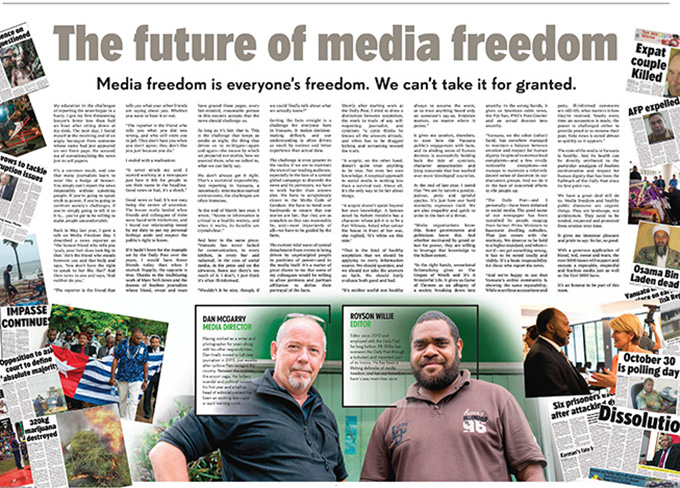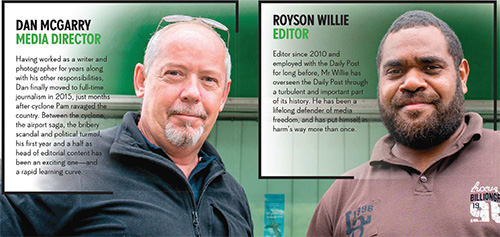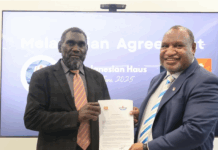
By Dan McGarry, media director of the Vanuatu Daily Post
Media freedom is everyone’s freedom. We can’t take it for granted.
My education in the challenges of reporting the news began in a hurry. I got my first threatening lawyer’s letter less than half an hour after sitting down at my desk. The next day, I found myself at the receiving end of an angry harangue from someone whose name had just appeared on our front page. He accused me of sensationalising the news just to sell papers.

It’s a common insult, and one that many journalists learn to wear like a badge of honour. You simply can’t report the news responsibly without upsetting people. If you’re going to speak truth to power, if you’re going to confront society’s challenges, if you’re simply going to tell it as it is… you’ve got to be willing to make people uncomfortable.
Back in May last year, I gave a talk on Media Freedom Day. I described a news reporter as “the honest friend who tells you ‘yeah, your butt does look big in that.’ He’s the friend who stands between you and that bully and says, ‘You don’t have the right to speak to her like that!’ And then turns to you and says, ‘And neither do you.’
“The reporter is the friend that tells you what your other friends are saying about you. Whether you want to hear it or not.
“The reporter is the friend who tells you what you did was wrong, and who still visits you in jail. They don’t hate you when you don’t agree; they don’t like you just because you do.”
Headline shock, good news or bad
I ended with a realisation:
“It never struck me until I started working at a newspaper just how it felt for people to see their name in the headline. Good news or bad, it’s a shock.”
Good news or bad. It’s not easy being the centre of attention. The lesson really landed when friends and colleagues of mine were faced with misfortune, and I found our relationship tested by my duty to put my personal feelings aside and respect the public’s right to know.
If it hadn’t been for the example set by the Vanuatu Daily Post over the years, I would have fewer friends today than when I started. Happily, the opposite is true. Thanks to the trailblazing work of Marc Neil-Jones and the dozens of fearless journalists whose blood, sweat and tears have graced these pages, every fair-minded, reasonable person in this country accepts that the news should challenge us.
As long as it’s fair, that is. This is the challenge that keeps us awake at night, the thing that drives us to re-litigate—again and again—the means by which we prepared our stories, how we sourced them, who we talked to, what we can fairly say.
We don’t always get it right. That’s a statistical impossibility. And reporting in Vanuatu, a notoriously information-starved environment, the challenges are often immense.
At the end of March last year, I wrote: “Access to information is critical to a healthy society, and when it works, its benefits are crystal-clear.”
And later in the same piece: “Vanuatu has never lacked for communication, in every kitchen, in every bar and nakamal, in the cess of social media, in the press and on the airwaves. Some say there’s too much of it. I don’t; I just think it’s often ill-informed.
“Wouldn’t it be nice, though, if we could finally talk about what we actually know?”
Getting the facts straight
Getting the facts straight is a challenge for everyone here in Vanuatu. It makes decision-making difficult, and our understanding is often driven as much by instinct and bitter experience than actual data.
The challenge is even greater in the media. If we are to maintain the trust of our reading audience, especially in the face of a cynical global campaign to discredit the news and its purveyors, we have to work harder than anyone else. We have to scrupulously cleave to the Media Code of Conduct. We have to bend over backwards to ensure that our stories are fair, that they are as complete as they can reasonably be, and—most importantly of all—we have to be guided by the facts.
The current tidal wave of cynical detachment from events is being driven by unprincipled people in positions of power—and in the media itself. It’s a matter of great shame to me that some of my colleagues would be willing to allow pettiness and partisan affiliation to define their portrayal of the facts.
Shortly after starting work at the Daily Post, I tried to draw a distinction between scepticism, the stock in trade of any self-respecting journalist, and cynicism: “A cynic thinks he knows all the answers already, and often has to be dragged kicking and screaming toward the truth.
“A sceptic, on the other hand, doesn’t quite trust anything to be true. Not even her own knowledge. A sceptical approach to social media is nothing less than a survival tool. Above all, it’s the only way to be fair about things.
“A sceptic doesn’t speak beyond her own knowledge. A famous novel by Robert Heinlein has a character whose job it is to be a Fair Witness. Asked what colour the house in front of her was, she replied, ‘It’s white on this side.’
“That is the kind of healthy scepticism that we should be applying to every information source. We should question, and we should not take the answers on faith. We should fairly evaluate both good and bad.
“It’s neither useful nor healthy always to assume the worst, or to trust anything based only on someone’s say-so. Evidence matters, no matter where it points.”
Sense of human decency
It gives me comfort, therefore, to note how the Vanuatu public’s engagement with facts, and its abiding sense of human decency is successfully holding back the tide of cynicism, character assassination and lying innuendo that has washed over more ‘developed’ countries.
At the end of last year, I noted that “We are by nature a gossipy, jealous, petty and spiteful species. It’s just how our herd mentality expresses itself. We are also empathic and quick to unite in the face of a threat.
“Media organisations know this. Some governments and politicians know this. And whether motivated by greed or lust for power, they are willing to leverage that knowledge to the fullest extent.
“In the right hands, sensational fictionalising gives us The Grapes of Wrath and It’s A Wonderful Life. It gives us Game of Thrones as an allegory of a society breaking down into anarchy. In the wrong hands, it gives us American cable news, the Fiji Sun, PNG’s Post-Courier and an actual descent into anarchy.
“Vanuatu, on the other (other) hand, has somehow managed to maintain a balance between emotion and respect for human dignity. In spite of numerous loud complaints—and a few vividly noticeable exceptions—we manage to maintain a relatively decent sense of decorum in our discussion groups. And we do it in the face of concerted efforts to rile people up.
“The Daily Post—and I personally—have been defamed in social media. The good name of our newspaper has been tarnished by people ranging from former Prime Ministers to basement dwelling nobodies. That just comes with the territory. We deserve to be held to a higher standard, and when—not if—we get something wrong, it has to be noted loudly and visibly. It’s a basic responsibility for those who report the news.
“And we’re happy to see that Vanuatu’s online community is showing the same reputability. While scurrilous accusations and petty, ill-informed comments are still rife, what matters is how they’re received. Nearly every time an accusation is made, the poster is challenged either to provide proof or to remove their post. Fake news is outed almost as quickly as it appears.”
State of Vanuatu media healthy
The state of the media in Vanuatu is healthy. And its health can be directly attributed to the particular amalgam of fearless confrontation and respect for human dignity that has been the hallmark of the Daily Post since its first print run.
We have a great deal still do to. Media freedom and healthy public discourse are organic things. They are landscape, not architecture. They need to be tended, respected and protected from erosion over time.
It gives me immense pleasure and pride to say: So far, so good.
With a generous application of blood, toil, sweat and tears, the next 5000 issues will support and sustain a reputable, respectful and fearless media just as well as the first 5000 have.
It’s an honour to be part of this team.
Dan McGarry is media director of the Vanuatu Daily Post; Royson Willie is the editor.














































Nicely crafted. Thanks Dan!
Comments are closed.